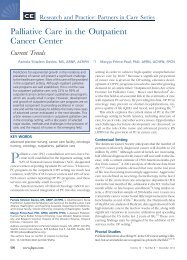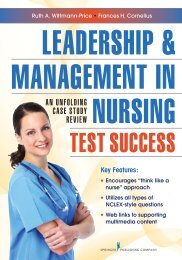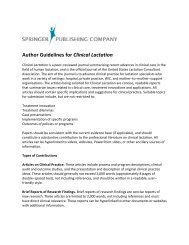Ruth M. Kleinpell, PhD, RN-CS, FAAN, FAANP - Springer Publishing
Ruth M. Kleinpell, PhD, RN-CS, FAAN, FAANP - Springer Publishing
Ruth M. Kleinpell, PhD, RN-CS, FAAN, FAANP - Springer Publishing
You also want an ePaper? Increase the reach of your titles
YUMPU automatically turns print PDFs into web optimized ePapers that Google loves.
Chapter 1 Measuring Outcomes in Advanced Practice Nursing 49<br />
research on APNs has further explored the effects of APN care on carerelated,<br />
patient-related, and performance-related outcomes.<br />
Yet, often the overall impact of APN care has been difficult to assess.<br />
Many studies group APNs and other midlevel care providers together;<br />
other studies, by virtue of their study design, preclude attributing direct<br />
causation of an outcome to APN care. The outcome studies on APN<br />
care that exist are not enough to describe the true outcomes that result<br />
from APN care. A concept analysis of outcomes for APNs highlighted<br />
the importance of the measurement of clinically relevant outcomes that<br />
reflect the work of the APN (Neis et al., 1999).<br />
The use of nurse-sensitive indicators to develop appropriate measures<br />
and outcomes for APNs has also been suggested (Wong, 1998), yet,<br />
determining which are most appropriate can be challenging. Identifying<br />
domains of APN practice may help in categorizing role functions that<br />
are unique to APN practice and that can be examined in terms of their<br />
effect on patient outcomes. Beal (2000) examined the practice of nurse<br />
practitioners working in a neonatal intensive care unit and identified<br />
nine domains of NP practice, including (a) diagnostic/patient monitoring,<br />
(b) management of patient health/illness, (c) administering/monitoring<br />
therapeutic interventions and regimens, (d) monitoring/ensuring<br />
quality of health care practices, (e) organization and work role, (f)<br />
helping role, (g) teaching/coaching role, (h) management of rapidly<br />
changing situations, and (i) consulting role. The case management role<br />
of APNs has also been highlighted (Foss & Koerner, 1997). Evaluating<br />
what a particular APN role encompasses in terms of role functions,<br />
enables outcomes that are affected by APN care to be more readily<br />
identified.<br />
Recent studies have focused solely on comparing APN care to other<br />
health care providers. Although it is important to establish that APN<br />
care does not differ (or is better) than that of other health care providers,<br />
research on the unique contributions and outcomes of APN care is<br />
needed. Several synthesis reviews on the impact of APNs on patient<br />
outcomes have confirmed that additional studies are needed to demonstrate<br />
APN importance to cost and quality outcomes in a variety of<br />
populations (Boyle, 1995; Sechrist & Berlin, 1998; Urden, 1999). As<br />
the APN role is expanding to a variety of unique practice settings,<br />
including inpatient hospital settings, subacute care, urgent care, home<br />
care, long-term care, and traditional primary care settings, the impact<br />
of the APN in these settings needs to be established.

















